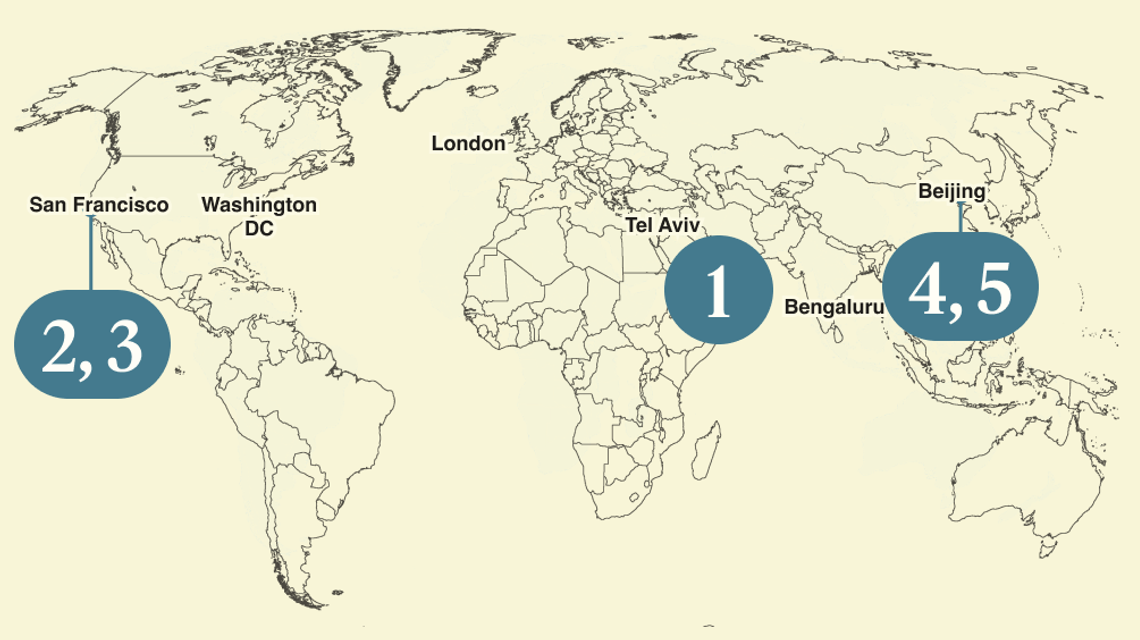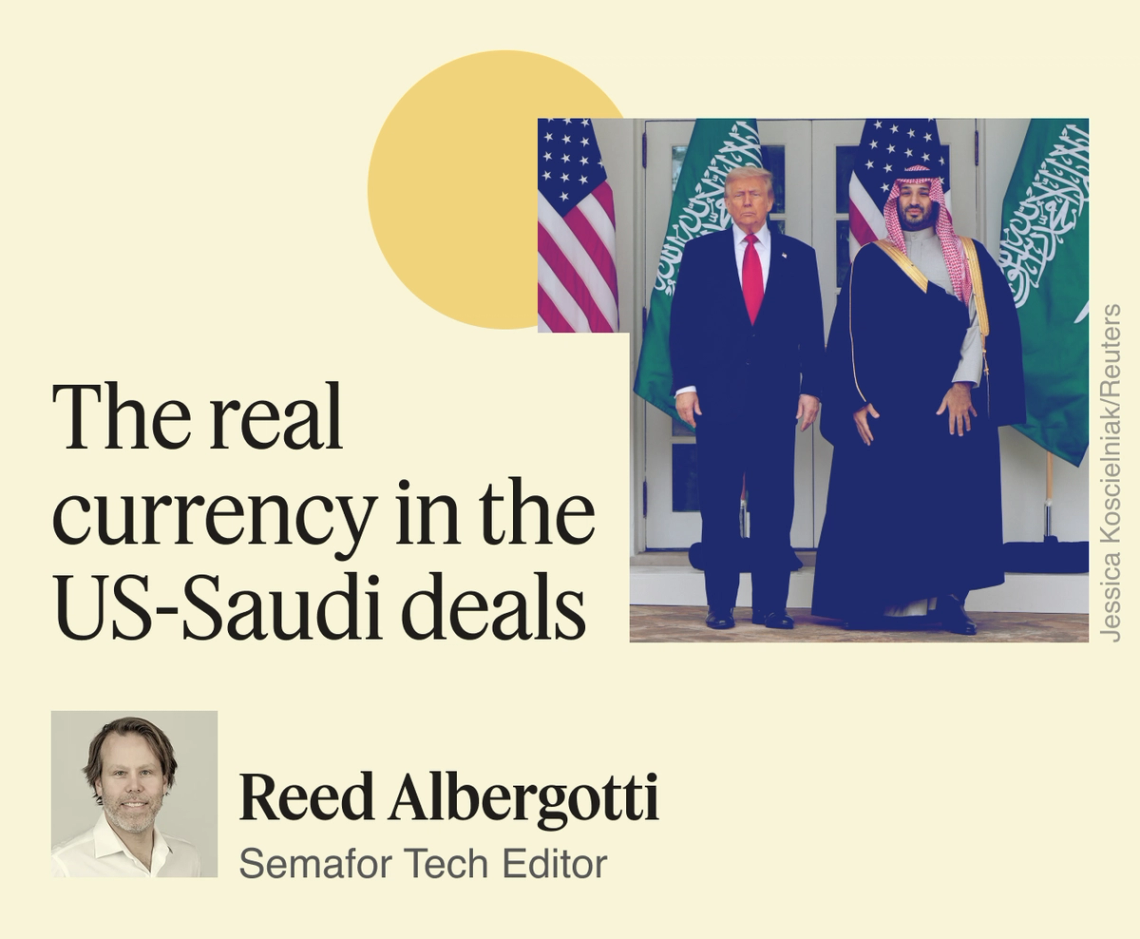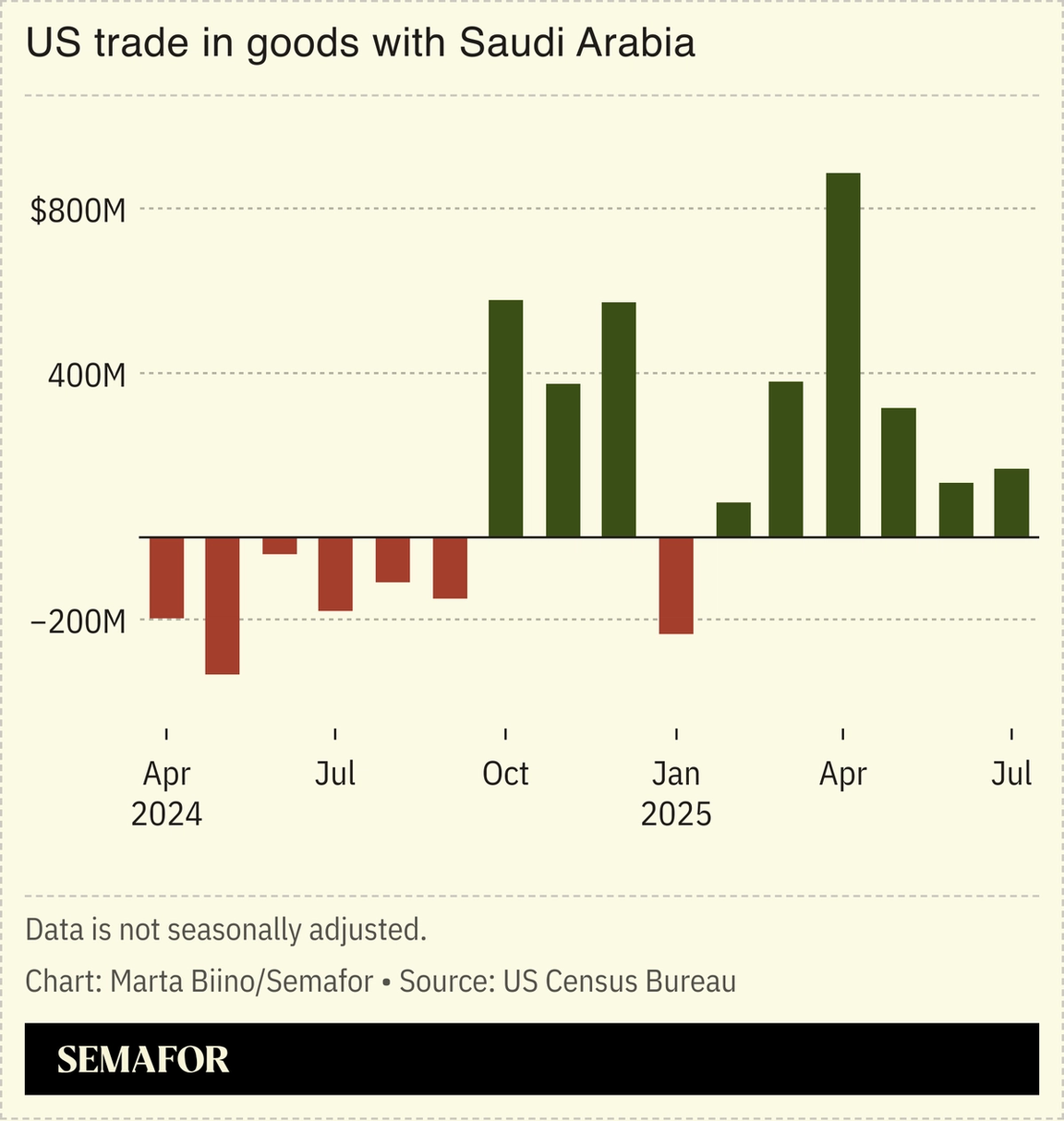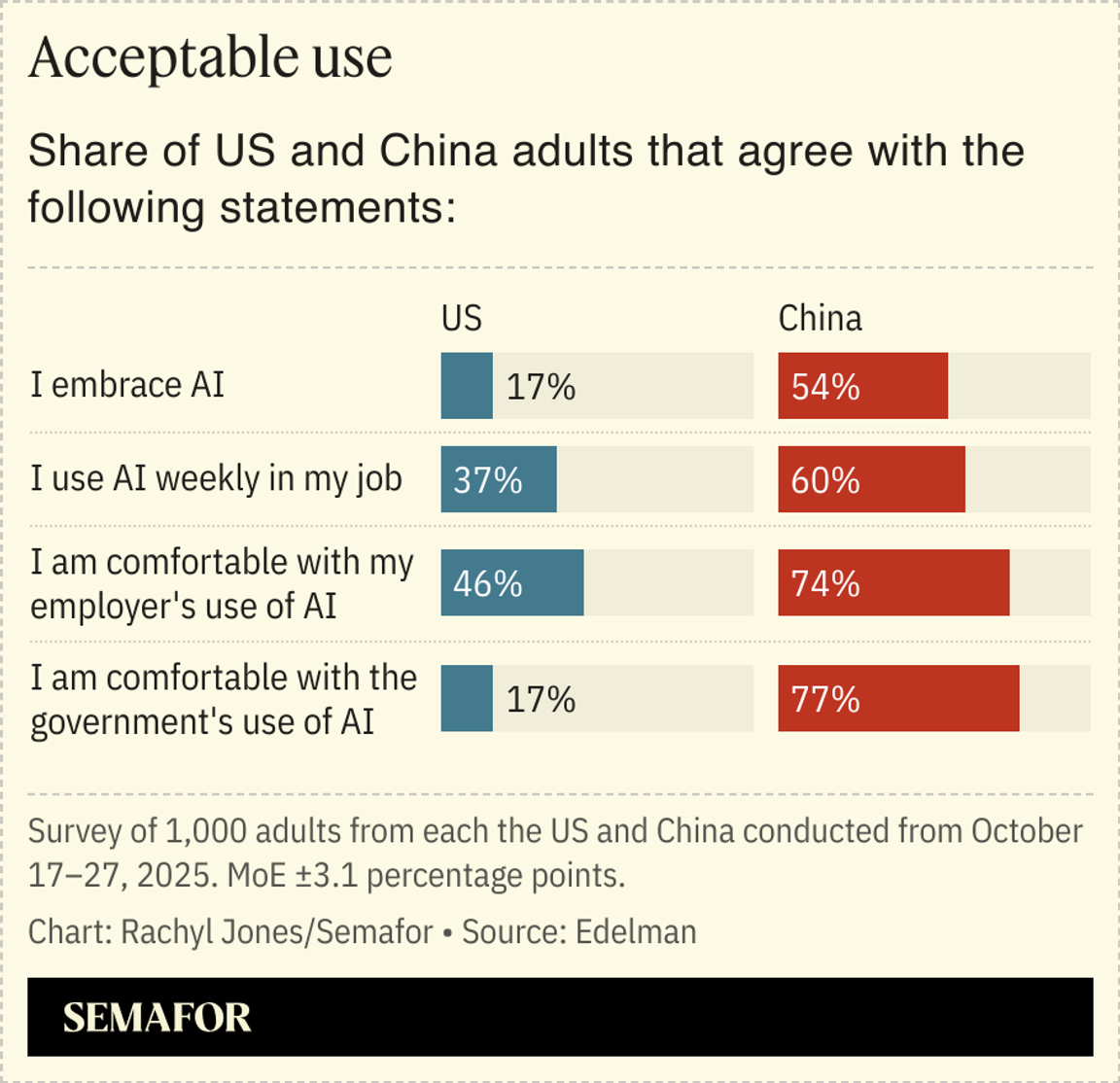| | In this edition, the Saudi Arabia-US tech deals rush in upon Crown Prince Mohammed bin Salman’s visi͏ ͏ ͏ ͏ ͏ ͏ |
| |  | Technology |  |
| |
|
 - Saudi tech deals rush in
- Rewiring Google search
- Big Tech bedfellows
- A quantum warning
- China bullish on AI trust
 What the US’ deals with Saudi Arabia tell us about the future of the Gulf country, and AI race cars are catching up to humans. |
|
 As my colleagues Liz Hoffman and Matthew Martin scooped, Saudi Crown Prince Mohammed bin Salman’s visit to the White House this week comes with a series of massive investments, including data centers that will carry the most advanced AI chips. While much of the tech industry, at least in Silicon Valley, looks at Saudi Arabia as a potential market for web services and, well, a piggy bank, there’s something much more interesting going on. Saudi Arabia wants to take these investments and parlay them into a feat that very few countries have accomplished: a high-tech transformation. Saudi is facing a looming deadline: As China floods the market with electric cars, the future of oil — the country’s main source of income — is looking bleaker than ever. Meanwhile, roughly 60% of the country’s 40 million people are under 30. A technology transformation is not what usually happens when hyperscalers build data centers overseas. It’s the companies that make the chips, pour the concrete, and sell the web services that typically get the value. It doesn’t lead to an explosion of startups or a vibrant tech ecosystem. Saudi Arabia wants to buck that trend, and it will not be an easy task. When tech companies make deals with the country to open up shop there, they are being asked to invest significant resources into helping train their young population to participate in the coming technology wave — at least according to some of the tech companies I have spoken with. And as Matthew just reported, state-backed AI startup HUMAIN announced today that it led a $900 million funding round for Silicon Valley-based media production startup Luma AI. (It marks one of many US-Saudi tech deals in the works that we highlight below.) But Luma will have to bring some of that cash back to Saudi Arabia, in the form of a partnership with HUMAIN to build a 2 GW data center and new AI models trained on Arabic and regional data. When I visited Riyadh last year, I went to a startup demo day, similar to what you’d see in San Francisco, but there are a lot fewer of them in Riyadh, and with fewer venture capital and angel investors hanging around. In a year or two, I’d expect to see an explosion in that kind of event, in new tech incubators, in Saudi nationals moving back to the country to start companies. If not, the Silicon Valley-Saudi partnership won’t be functioning as planned. |
|
MBS’ visit heralds in tech deals |
 A slew of tech deals are flying in this week, largely revolving around new AI facilities in Saudi Arabia. Elon Musk is working with HUMAIN on a new data center for xAI in the kingdom, powered by Nvidia chips, he said Wednesday at the US-Saudi Investment Forum. Starting with 50 megawatts of energy usage, with ambitions to reach 500 megawatts, it would be the company’s first data center outside the US. AWS reached a similar deal with HUMAIN on a 100 megawatt facility, with the goal of growing it to 1 gigawatt, Saudi Arabia’s communications and information technology minister said Wednesday. AMD, Cisco, and HUMAIN also announced plans for a 1-gigawatt data center in the kingdom, starting with 100 megawatts next year. And HUMAIN separately announced funding with Luma that involves moving a large part of its data infrastructure to the kingdom. Beyond data centers, Nvidia’s Jensen Huang also announced it is working with Saudi Arabia to build supercomputers that will control quantum computers and power their compute-heavy error correction systems. As part of the dealmaking frenzy, the US is set to approve the sale of advanced AI chips to Saudi Arabia. Securing access to US semiconductors is crucial for Saudi Arabia’s plan to pitch itself as a global AI hub: Of the $1 trillion Saudi investment pledge, the crown prince said $50 billion could come just from the kingdom’s AI infrastructure buildout. More tech deals are expected to continue throughout the day, with executives from Chevron, Google, Pfizer, and Qualcomm slated to speak. |
|
New Google feature could reshape search functions |
| |  | Reed Albergotti |
| |
 Google DeepMind/YouTube Google DeepMind/YouTubeThe core function of internet search — to find websites — has been rapidly changing in the AI era. One of Google’s many product announcements Tuesday, which came with the release of Gemini 3, makes me think we haven’t really seen anything yet. The new feature, called “generative UI,” will essentially create a working web application from a single prompt like: “Help me learn about how AI data centers work” and build an interactive website with animations. Most people are visually oriented, so it’s difficult to imagine that most consumers will prefer paragraphs of text to interactive graphics and animations, once they’re available. But this isn’t something Google can roll out to all of its billions of users today. When I spoke with Google Labs Vice President Josh Woodward and DeepMind CTO Koray Kavukcuoglu this week, they confirmed as much. But the nature of AI is that features that are expensive today become table stakes within months. These could soon be everywhere. If I’m right about what search will soon look like, it raises two questions: How will companies monetize it, and how will it change the internet as it exists today, even more than AI has already changed it? |
|
Anthropic, Microsoft, Nvidia expand funding wheel |
 A Microsoft data center in Wisconsin. Audrey Richardson/Reuters. A Microsoft data center in Wisconsin. Audrey Richardson/Reuters.Round and round we go. Anthropic has agreed to purchase $30 billion in Microsoft Azure compute; Nvidia will invest up to $10 billion in Anthropic; and Microsoft up to $5 billion in the startup, the companies announced Tuesday. The deal is the latest in a web of AI firms passing money around in ways that may appear as value creation, nearly doubling Anthropic’s valuation to $350 billion, CNBC reported. The money circulation also underpins the argument of an AI bubble — a stance that some bankers and industry leaders aren’t refuting. Google’s Sundar Pichai recently told the BBC there are “elements of irrationality” to the AI boom and that “no company is going to be immune [to a bubble burst], including us.” In a podcast last week, Goldman Sachs Research’s Eric Sheridan said, “There are things you can point to right now that rhyme with 1998, 1999.” As with any of these pooled AI deals, the question is who gets the better end of the bargain and who might be acting out of desperation or irrational exuberance. Microsoft has been hedging its AI bet, avoiding dependency on any one foundation model company while developing its own. Its data centers are designed so they can be used for different kinds of workloads and new AI architectures in the future. Still, as Pichai pointed out in his interview, a big crash will affect everyone, no matter how savvy their CEO has been. |
|
US warns of China’s quantum security risk |
 A quantum satellite being launched in China. China Daily via Reuters. A quantum satellite being launched in China. China Daily via Reuters.A report released Tuesday by a congressional commission warns that China is leading in quantum communication, which could be a national security risk for the US. At least one CEO of a quantum networking company agrees. “We can’t afford to treat quantum technologies as a future ambition when our adversaries are already ahead in the quantum race,” Qunnect CEO Noel Goddard said in a statement to Semafor. The commission’s report cited China’s central planning as the reason its quantum communication technology is so advanced. Because of the theoretical ability of quantum computers to break encryption, current versions of secure communication could be vulnerable. By using the principles of quantum mechanics, it’s possible to create networks that quantum computers can’t crack. Goddard tied a lack of investment in quantum to a 2020 advisory by the National Security Agency that expressed doubts about one particular type of quantum networking, called quantum key distribution. While Qunnect doesn’t use QKD, she said the statement scared away investors from the entire space. “One way to accelerate development would be to revisit the NSA’s 2020 decision that discouraged investment in quantum networks before the technology matured.” China’s focus on national security applications of quantum, though, could also be a weakness in its overall strategy, the report said. US companies, from Google to IBM to startups like PsiQuantum, have made huge breakthroughs in quantum computing. |
|
Trust in AI higher for China, Brazil residents than for Americans |
It may not matter if the US produces the best AI technology if Americans don’t use it. A new report by PR firm Edelman, which surveyed 5,000 individuals from various countries, found Chinese and Brazilian respondents significantly more open to using AI than participants from the US, UK, and Germany — a trend that persisted across all age groups. Individuals from Brazil and China were also more likely to believe the technology will solve environmental, mental health, and financial challenges. Critics of the AI safety movement say one reason for the anti-AI sentiment in the US is a well-funded lobbying campaign against the technology.  Perhaps the disconnect isn’t in whether individuals want to use AI, but in their requirement of it: 79% of Chinese respondents said they feel the use of generative AI is being “forced” on them, compared to 59% of US survey participants, Edelman told Semafor. Given this information, US companies may need to incentivize workers to further adopt AI if the US wants to keep its tech advantage. |
|
 There has never been a better time to subscribe to MIT Technology Review. For a short time, subscribe and save 50% on any annual subscription. Plus, receive 2 in-depth digital reports, as well as an exclusive event session on what’s next in AI. Claim your 50% savings today. |
|
 Courtesy of Abu Dhabi Autonomous Racing League Courtesy of Abu Dhabi Autonomous Racing LeagueFast and Autonomous. Former Formula 1 driver Daniil Kvyat drove against an AI-powered race car in Abu Dhabi, where he clocked a faster time but failed to catch up with the autonomous vehicle’s head start. Only 1.6 seconds separated the best laps of the human and the vehicle, compared to last year’s 10-second gap, indicating significant performance improvements in the AI. Created by the Technical University of Munich, the car competed against Kvyat after winning against five other autonomous race cars. The event highlights the increasing ability for AI-powered robots to make high-stakes, split-second decisions with applications from the racetrack to the battlefield. |
|
|